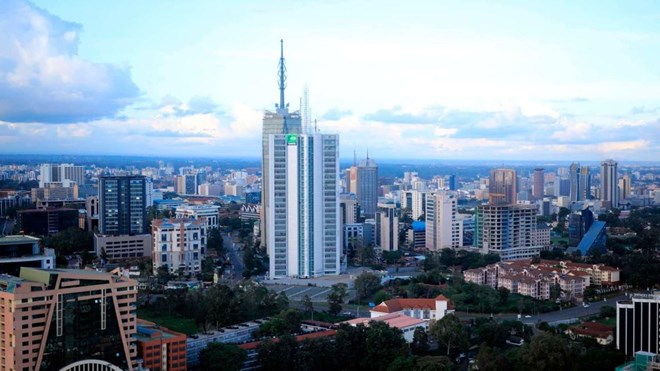
By DOMINIC OMONDI
Wednesday April 24, 2024

Skyline of Nairobi City in Kenya. FILE PHOTO | NMG
Kenya will overtake Angola to become the fourth largest economy in sub-Saharan Africa this year, behind South Africa, Nigeria, and Ethiopia, a forecast by the International Monetary Fund (IMF) shows.
The forecast sees Kenya maintaining that position until the end of 2029.
Last year, Kenya’s GDP was estimated to have grown to $108.9 billion (Ksh15.14 trillion, using the current exchange rate) from $113.7 billion (Ksh13.37 trillion on the existing rate then) in 2022.
Ethiopia, which has extended its lead over Kenya, is projected to overtake Nigeria in two years to become the second-largest economy in the region.
The size of the Ethiopian economy — which was smaller than Kenya’s in 2020 — continued to grow and is estimated to have increased to $159.74 billion (Sh21.165 trillion) in 2023, widening the gap between it and Kenya.
Ethiopia’s economy is also expected to hold steady at the second position for three years to 2029.
But there are fears that Ethiopia’s gross domestic product (GDP) or the value of goods and services produced in the country, is overstated. The country emerged from a two-year civil war that ravaged its economy in 2022 and is one of the African countries that have defaulted on one of its debt obligations.
Charlie Robertson, head of macro strategy at FIM Partners UK Ltd, an investment management company, described the Ethiopian exchange rate as a “fantasy exchange rate.”
“Ethiopia is maintaining a hugely overvalued exchange rate which is not supported by reality,” said Robertson in an email response.
According to the FIM Partners FX model, a realistic exchange rate for the Ethiopian Birr is about 97 against the dollar, while the official rate is 57.
Coming from a GDP of $118.97 billion, the IMF estimates the Ethiopian economy to have grown by 7.2 percent last year, the fastest GDP growth in the Sub-Sahara.
Kenya, on the other hand, is estimated to have grown by a slower pace of 5.5 percent in 2023, as the economy emerged from a year that was characterised by drought and tight global financial markets owing to the war in Ukraine.
Kenya is expected to release its official GDP numbers for 2023 this month.
In 2022, when Ethiopia was just coming out of a two-year civil war, the Horn of Africa country had a GDP of $118.97 billion (Ksh15.76 trillion, using the then exchange rate), bigger than Kenya’s $113.7 billion (Ksh13.37 trillion) as built on the lead it established in the previous year.
A higher GDP is one of the magnets for investors because it is an indicator of a healthy economy.
Ethiopia, Africa’s second most populous country, is expected to maintain a higher GDP than Kenya, according to the IMF. The forecast is contained in the database for the April 2024 World Economic Outlook.
However, some experts have poked holes in the IMF’s forecasts, citing the credibility of Ethiopia’s exchange rate.
As of the end of Monday, 56.9 Ethiopian Birr fetched one dollar while 132.5 Kenyan shillings bought a unit of the US currency.
To get an estimate of GDP in dollar terms, Robertson noted the IMF uses the official rate, which then puts the size of Ethiopia’s GDP in 2023 at around $160 billion against Kenya’s $109 billion.
“But at a realistic exchange rate, [Ethiopia’s] GDP was probably $90 billion. Kenya’s GDP by comparison was $109 billion in 2023. So, if you use the official figure, you’d say Ethiopia’s economy was about 50 percent bigger than Kenya – but in reality, Kenya’s economy is bigger.”
The IMF says the World Economic Outlook data are compiled by its staff at the time of the exercise.
"The historical data and projections are based on the information gathered by the IMF country desk officers in the context of their missions to the IMF member countries and through the ongoing analysis evolving in each country," explained the IMF's Research Department in the World Economic Outlook.
IMF Kenya resident representative Selim Cakir did not respond to Business Daily calls for this story.
Ethiopia has been going through a rough patch, coming from a two-year civil war that ravaged its economy.
It became Africa's third defaulter after it failed to make a $33 million "coupon" payment on its Eurobond. The Government has applied for debt restructuring with the G20 Common Framework (CF) in January 2021.
Ken Gichinga, an economist, reckons that although it is difficult to refute figures that can only be computed by governments such as GDP, “colloquial wisdom” contradicts the IMF numbers. “All things constant, somebody might say this country has a bigger market, and if a country has a bigger market, it should attract more business,” said Mr Gichinga.
Tanzania is the third largest economy in eastern Africa with a GDP of $79.44 billion in 2023, followed by the DRC ($67.3 billion), and Uganda ($51.8 billion).
Rwanda’s GDP was estimated at $14.02 billion and Burundi ($4.2 billion).